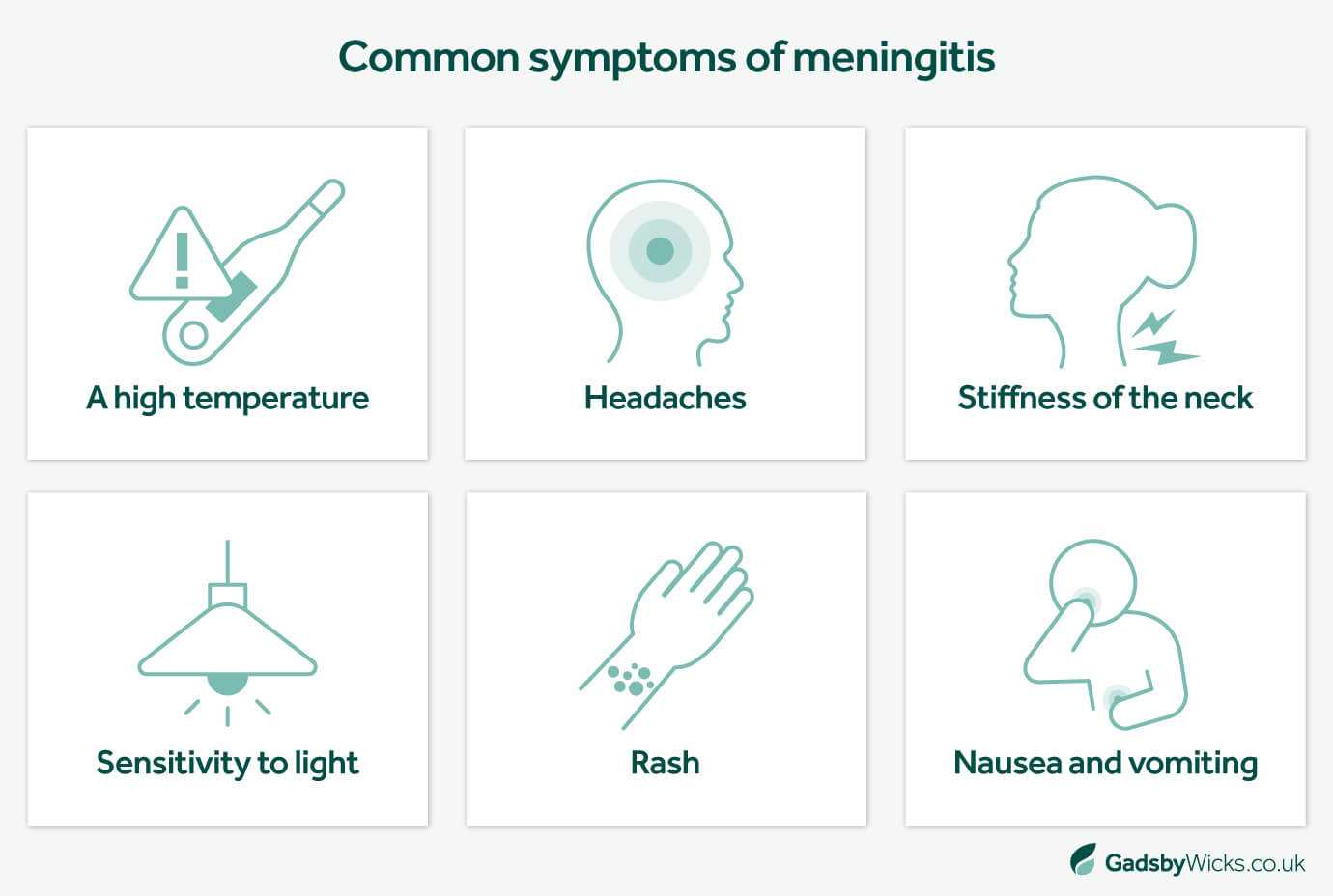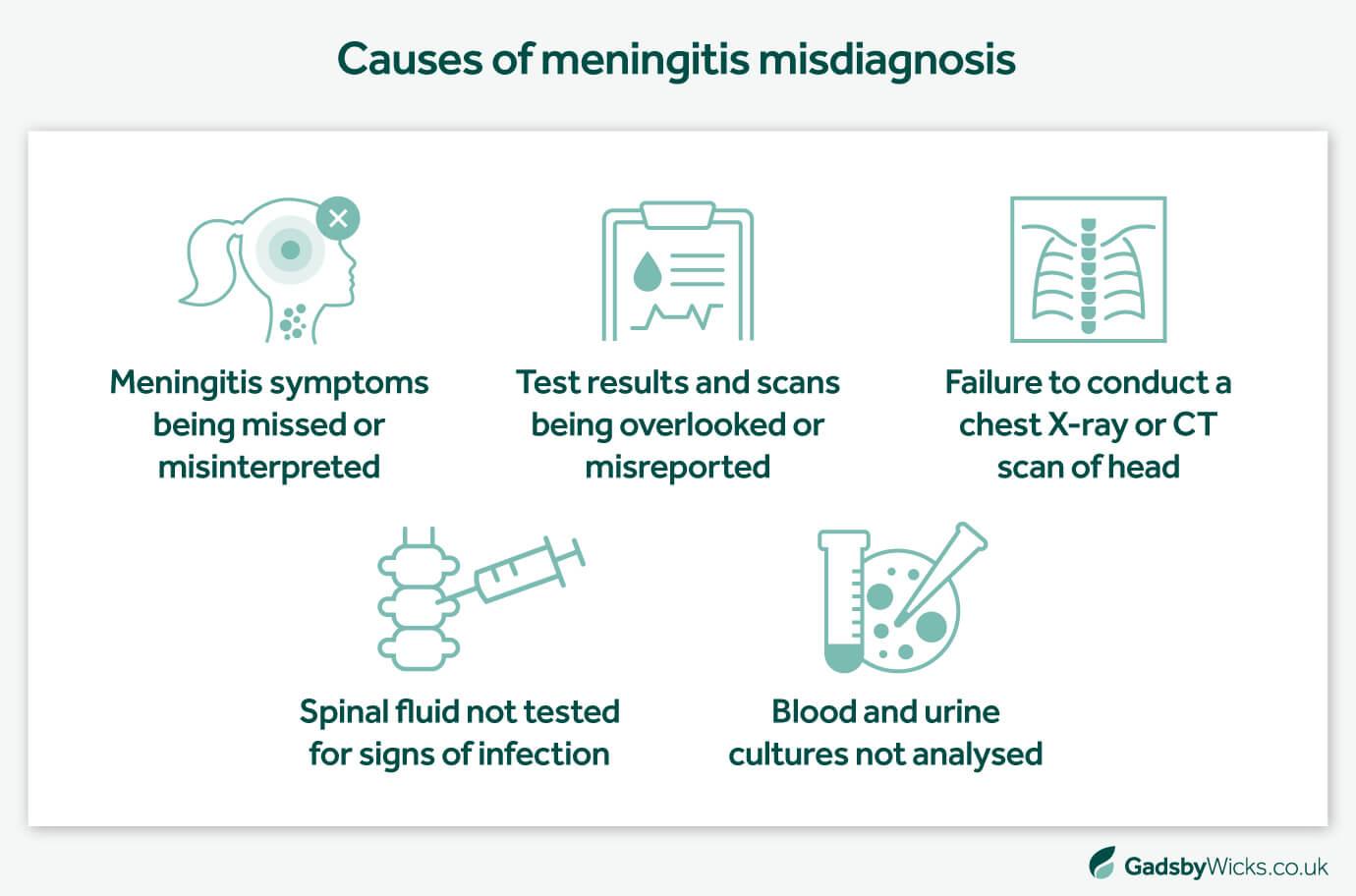
Solicitor and Managing Partner
Gillian Gadsby
If you have been affected by meningitis misdiagnosis, we have over 25 years experience and expertise to help you claim the compensation you deserve.

Meningitis can have devastating, permanent and sometimes fatal consequences for people of all ages when symptoms are missed and treatment is not started promptly.
If a nurse, doctor or another healthcare professional fails to spot the signs of a loved one’s condition, we can help you pursue a medical negligence claim to get the compensation and justice you deserve.
For your safety and convenience
video meetings are now available with all our specialist solicitors.
Call us on 01245 494929 or request a callback
Call me back
Meningitis is a very severe and life-threatening infection that causes the membranes around the brain and spinal cord to swell. If treatment is not provided swiftly, severe infection can very quickly cause irreversible damage and even death.
There are two main types of meningitis – viral meningitis and bacterial meningitis.
Viral meningitis is the most common form, and will rarely be life-threatening. However, delayed diagnosis or treatment can still have lifelong after-effects, including risk of brain injury, sight and hearing loss, and behavioural difficulties.
Bacterial meningitis shares many of the same symptoms as viral meningitis, but is significantly more virulent. The health of those affected can deteriorate rapidly, requiring rapid hospital admission and treatment with antibiotics to prevent serious consequences and possibly even death.
Meningitis interferes with the lining of the brain and spinal cord. As these membranes become inflamed, an increased amount of pressure is placed on these critical and highly sensitive areas of the body.
If a medical professional does not intervene quickly upon recognising symptoms of meningitis, prolonged swelling can cause brain damage, inhibit motor functions and lead to other life-changing consequences.
In some cases, meningitis can also release toxins that infect the blood. This can cause sepsis, leading to organ failure, requiring the need to amputate limbs or digits and, if left untreated long enough, may even prove fatal.
You can find out more about the dangers of not spotting meningitis soon enough in our insights.
Although meningitis is a very dangerous disease, many of its symptoms are nonspecific, often appearing in any order. As a result, this can make diagnosing the condition difficult, especially in the early stages.

Because babies are also vulnerable to meningitis, they can show different symptoms, including:
A greater amount of irritability
High-pitched crying
Swelling of the soft spot at the top of their head
Although meningitis can affect anyone, groups where this condition is most common include:
Babies and young children
Teenagers and young adults
Elderly people
People with weakened immune systems
Additionally, because this condition attacks the brain and spinal cord, people undergoing certain medical procedures, such as spinal surgery, childbirth or nasal surgery, may be more likely to catch meningitis.
The viruses and bacteria that cause meningitis can be spread in numerous ways, including coughing and sneezing. However, it is uncommon to catch meningitis from someone with this condition – the infection is often spread by people who carry viruses or bacteria in their nose or throat, but are not ill themselves.
Whether infection occurs in close contact with others, or during medical procedures in hospital, the window of time that someone has between first exposure to bacterial meningitis and life-altering consequences can be as short as a single day.
To minimise the impact that meningitis can have on a person’s health, it is crucial that medical professionals act upon any red flags of meningitis, administering antibiotics and referring for further tests and examination where necessary.
Situations that can lead to a meningitis misdiagnosis, and potentially be the grounds for a negligence claim, include:

If a doctor, nurse or another healthcare professional fails to identify the signs of meningitis, mistakes it for a less serious condition or fails to provide an acceptable standard of care to you or a loved one, it can lead to serious repercussions, including:
Life-threatening blood poisoning (septicaemia/sepsis)
Amputation of limbs or digits
Permanent damage to the brain and nerves
Learning difficulties and behavioural problems
Total or partial blindness
Total or partial hearing loss
Epilepsy or recurrent seizures
Organ failure
Arthritis and other bone/joint problems
The repercussions of a meningitis misdiagnosis are not just physical – it can permeate every facet of your life. If you can no longer work, you could lose your family’s main source of income, making your future feel uncertain.
Your injuries may also require the permanent addition of aids around the home, in the car or at work. Varying degrees of care may also be required to support you for the remainder of your life.
To give you the ability to maximise your quality of life, and seek justice for the clinical negligence you have endured, our misdiagnosis claims solicitors can provide you with the support and strength to pursue compensation.

As qualified and specialised medical negligence solicitors with over 20 years experience, we are experts at handling meningitis misdiagnosis claim cases.
Our credentials and established reputation mean that hospitals and trusts are willing to work with us, and often recommend us, to seek fair outcomes for claimants to receive the compensation they deserve.
Trust us with your compensation claim and contact us today to see how we can help you.
Everyone has a right to expect a certain quality of care. And when that care falls below a certain standard, this can form the basis of a medical negligence case.
Whether a healthcare professional fails to spot the symptoms, doesn’t act on warning signs of meningitis, or prescribes the wrong medication, medical negligence can take many forms and have varying degrees of consequences for those affected.
Proving whether the care you or a loved one received was negligent relies on answering the following three questions in the eyes of the law:
Did a healthcare professional breach their duty of care towards you?
Have you suffered any financial losses, injuries or pain as a result?
Was the professional’s breach of duty directly responsible for your pain and suffering?
As medical negligence experts, we seek to create as solid a foundation as possible for our clients so that they can pursue claims for meningitis with confidence.
This often involves having discussions with relevant medical experts to determine whether the treatment received was of an acceptable standard, and if the actions of the accused were reasonable, given the information they had at the time.
To form a complete picture and present a strong case, we devote the time and resources necessary to assess all available evidence, including:
Medical records
Personal statements
Photographs
Witness statements
Compensation for medical negligence is designed to place you or a loved one in the position they should be in if the negligence had not happened, by allowing the purchase of aids, adaptations, homes, vehicles and any necessary treatment and therapies, as well as making up for financial losses such as loss of earnings.
This can include:
Adaptations to the home and vehicles
Future financial losses due to an inability to work
Ongoing treatments, prescriptions and medication
Any care required now and in the future
Therapies for any physical or psychological harm caused by the experience
It is impossible to accurately determine the value of compensation you can expect to receive until your case has been thoroughly investigated by a medical negligence solicitor. However, it will be calculated based on both the pain and suffering you endured and your long-term needs as a result of your injuries.
You can learn more in our essential guide to medical negligence compensation.
As each and every medical negligence claim is unique, it is impossible to predict how long any single case will take to reach final settlement. Nonetheless, in most circumstances we would anticipate a claim to take between two and five years to reach final settlement.
The stance taken by the defendants can greatly influence the time it takes to complete a claim, as can the availability of relevant medical experts and the overall complexity of your specific case.
The standard time limit to make a meningitis misdiagnosis claim is three years from your Date of Knowledge. There are exceptions to this rule:
Claimants under the age of 18 have until their 21st birthday to make a claim
There is no time limit for claimants who are considered mentally incapacitated
If your three-year window has already closed, we would still encourage you to get in contact to discuss your case further. Each claim is at the discretion of the Court, and we have the experience and knowledge to advise on whether or not your claim is still viable.
Whether it's the loss of a limb or the death of a family member, knowing where to start to claim the compensation and answers you and your loved ones so rightly deserve can be overwhelming.
As clinical negligence specialists, our expert solicitors at Gadsby Wicks can guide you through every step of the process so you receive your right to justice.
We have been providing specialist legal advice since 1993
We can fund your claim on a ‘No Win, No Fee’ basis
96% of claims we handle are settled outside of the courtroom
We have in-house medical professionals to assist with your case
If you believe that your health or safety has been compromised through no fault of your own, we are ready to help you take action as soon as possible. Complete our online form or get in touch to discuss the details of your case.
If you or a loved one have experienced medical negligence and would like to speak to someone about your options, our team is here to listen and advise you on your next steps.